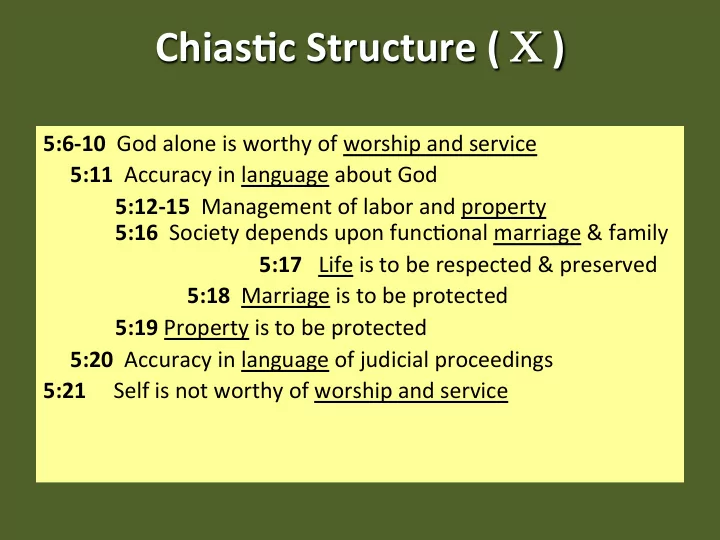

Chias&c Structure ( Χ ) 5:6‐10 God alone is worthy of worship and service 5:11 Accuracy in language about God 5:12‐15 Management of labor and property 5:16 Society depends upon func;onal marriage & family 5:17 Life is to be respected & preserved 5:18 Marriage is to be protected 5:19 Property is to be protected 5:20 Accuracy in language of judicial proceedings 5:21 Self is not worthy of worship and service
God ’ s Design of Society LIFE (protected) LIFE (jeopardized) MARRIAGE & FAMILY MARRIAGE & FAMILY (strong & functioning) (weak & dysfunctional) LABOR & PROPERTY LABOR & PROPERTY (respected & productive) (demeaned & wasted) INTEGRITY of INTEGRITY of COMMUNICATION COMMUNICATION (consistently states truth ) (deceitfully professes truth for agendas) HEART ALLEGIANCE (to HEART ALLEGIANCE (to God) self)
“ There is probably no single factor which has contributed more to the prosperity of the West than the relative certainty of the law which has prevailed here. This is not altered by the fact that complete certainty of the law is an ideal which we must try to approach but which we can never perfectly attain. . . .But the degree of the certainty of the law must be judged by the disputes which do not lead to litigation because the outcome is practically certain as soon as the legal position is examined. It is the cases that never come before the courts, not those that do, that are the measure of the certainty of the law. ” F. Hayek
“ There is little doubt that the proliferation of lawyers in the United States in the later years of the twentieth century was a sign of a major breakdown of its moral and legal order. The United States in 1990 had some 730,000 lawyers – 70 percent of the world ’ s total. In 1990, Japan had 11 lawyers per 100,000 in population; the United Kingdom, 82; Germany, 111; the United States, 281. Japan had 115 scientists and engineers per lawyer; United Kingdom,14.5; Germany, 9.1; United States, 4.8 ” G. North
“ We ’ ve become a society in which the rules are in flux, thereby prodding people to spend a large amount of their time and resources trying to change the rules to their benefit. . . .In the beginning the Constitution was a set of rules. . .that pretty much encouraged the entrepreneurial type of person to go out and . . .create wealth. Somewhere around the 1870 ’ s the constitutional climate started changing dramatically, not by amendment but by interpretation. . . .The Supreme Court said the state legislatures could pass any sort of regulations they wanted about economic affairs so long as they were ‘ reasonable. ’ That meant, of course, that people spent a lot of time trying to get regulations written to their advantage or to the disadvantage of their competitors. ” J. P. Hill
“ Today, much of the economic game is in the political arena. It is played by getting rules on your side, or making sure that somebody else doesn ’ t get the rules on their side against you. The action is in Washington, D.C. It ’ s interesting to look at the statistics of many large companies and see how much of their time goes into lobbying, where their business headquarters are, who the big players are, etc. It turns out that it ’ s just as important to try to make sure that the rules favor you as it is to produce better products. Any society in which the rules are not clearly defined, whatever they are, is at risk. You need a society of stable, legitimate and just rules in order to have people productively engaged. ” J. P. Hill
“ The poverty rate for married-couple families with related children under 18 in Baltimore is only 7.4%. . . .Education is also important: female-headed households with less than a high school degree have a poverty rate of 44.1%; the rate is 11% for those with a college degree. . . .Government policies can influence one ’ s choices and the level of responsibility one takes. The growth of the welfare state has eroded personal responsibility and made the poor more dependent. ” J. Dorn
“ A huge underclass has captured politicians for their cause of maintaining and increasing [welfare payment] transfers rather than limiting the size and scope of government to make people more responsible and foster economic growth. . . .Part of [Baltimore ’ s poverty problem] lies in the rise of government welfare and the decline in morality. . . .It ’ s time to think about how to reduce latent poverty and make people more responsible for their choices. ” J. Dorn
Recommend
More recommend